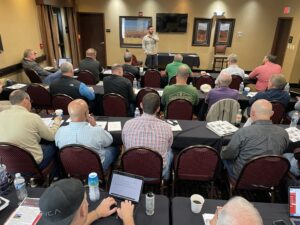
RIDGECREST, N.C. (BP)–Dropping the “s” from missions education signals a big change in how the North American Mission Board intends to generate interest and support for building the kingdom of God at home and around the world.
Evangelism, domestic and international missions and volunteer mobilization are all tied into the awareness concept now being called “mission education.” The goal is part of a broader emphasis at NAMB to help mobilize a growing force of “on mission” Christians eager to join God in his mission of reconciling the world to himself — in whatever way they are uniquely equipped to do so.
Tim Seanor, NAMB’s director of mission education, said one way of describing the new approach is, “You can discover your mission through mission education.”
“Christians can participate in the mission of God. That’s why we drop the ‘s’ from missions education,” Seanor said. “Missions becomes more than just a collection of projects and works. The mission God gives us becomes a passion.
“Mission education is to understand how we fit in the mission of God,” he added. “God made us all different, so that when we become reconciled to him, we have a unique place in his mission.”
NAMB staff introduced the concept this summer at both the Jericho ’98 missions festivals and the agency’s On Mission ’98 conference Aug. 1-6 at Ridgecrest (N.C.) Conference Center.
The new approach is based on four “on mission” principles that also are at the core of the new NAMB flagship magazine, “On Mission.” The principles were the primary emphasis of the On Mission ’98 conference, which previously was known as North American Mission Board Week.
An on-mission Christian, according to the concept, is:
— spiritually awakened to the need for joining God in his mission of reconciling the world to himself through Jesus Christ.
— continually adjusting, making the changes necessary in order to join God in his mission.
— evangelistically active, becoming personally involved in seeing people come to faith in Christ on a regular basis — whether across the street, across the country or in another country.
— a passionate advocate, encouraging other Christians — as an outgrowth of their own excitement at finding their personal fit for joining God in his mission — to become awakened as they themselves have been. The cycle then is repeated through the lives of others, and the number of on-mission Christians is multiplied.
“One of the stereotypes Christians have is that missions education is the process of sitting down in a chair and studying a story about a missionary. This story is about someone that you’re going to pray for and give money to support, but with whom you usually have no personal connection,” Seanor said. “That’s not what I’m talking about with mission education.”
In NAMB’s published mission education materials — which include magazines, videotapes and curriculum that are usable in a variety of different venues — the emphasis will be on developing the on-mission principles. Missionaries will serve as examples of how those principles are at work.
“In other words, if we’re talking about being an advocate, we’re going to talk about a missionary and how they became an advocate, and how we can be an advocate,” Seanor said. Mission education materials produced for organizations will be adaptable, allowing leaders to insert mission education components into other ministries, he said.
NAMB was assigned the role of missions education during the 1997 reorganization of Southern Baptist Convention agencies. It inherited the missions education programs of the former Brotherhood Commission — such as Royal Ambassadors and Challengers — and its new adult program is being called Missions in Motion.
In addition to the formal organizations, however, NAMB hopes to encourage churches to develop “On Mission Teams.” Although similar in concept to a previous model for missions development councils, On Mission Teams would include representatives from all areas of the church that contribute to building “on mission” Christians. The concept is also flexible enough to allow churches to choose the structure that works best for them.
They could include representatives of all groups with on-mission goals — including Sunday school, mission education organizations, youth groups or evangelism programs. An On Mission Team also can be structured around the principles themselves, Seanor said, with some groups focusing on awakening, others focusing on adjusting, others focused on activating and still others on advocating.
“We look at the On Mission Team as an administrative strategy-driven umbrella that focuses all of the energy of the church to reach the community,” Seanor said.
The approach allows mission education to be incorporated into the total life of a church. Participation in traditional missions education organizations is critical to advance mission involvement, Seanor said, but individuals who might not attend one of the groups can be awakened through other activities as well. The different directions of promoting overseas missions, local evangelism or volunteer mission trips are unified with the focus on on-mission principles.
“If you’ve got an on-mission church with on-mission activities, you don’t have to wonder about where the praying or the giving or the going is coming from,” Seanor said. “The people are excited about it. … The ‘I can do this with God’ is missing many times in our missions education activities.”
A youth group leader incorporated onto an On Mission Team, for instance, can help suggest where youth could assist in implementing on-mission strategies. Special events for promoting on-mission principles are a part of the process, as are age- and gender-specific mission education organizations.
“For years we’ve said missions is everything we do in the church, but we’ve been so general about it we’ve never really understood how we can make that happen. Through mission education, that’s what we’re going to do. We’re going to help individual Christians find their fit and how they can join God in his mission,” Seanor said.
(Additional materials on developing and incorporating on-mission principles in the life of the church can be found in On Mission magazine, available free through the North American Mission Board by calling 1-800-233-1123 or signing up on the magazine’s Internet site, www.onmission.com. A book offering suggestions on developing an effective On Mission Team will be available through NAMB this winter.)
–30–
Conference speakers amplify
NAMB’s ‘on mission’ thrust
By Lynne Jones
RIDGECREST, N.C. (BP)–Mobilizing Christians and churches to be on mission with God was the focus of On Mission ’98, the North American Mission Board’s conference at Ridgecrest (N.C.) Conference Center Aug. 1-6.
Conference preachers closed out each weekday by examining the four “on mission principles” that served as the focus for the event. An on-mission Christian — one who has joined God in his mission of reconciling the world to himself — is spiritually awakened, continually adjusting, evangelistically active and a passionate advocate, according to the concept.
A spiritually awakened Christian lives as a daily disciple in a personal relationship with God, according to John Avant, pastor of New Hope Baptist Church, Fayetteville, Ga.
Speaking from Isaiah 60, Avant noted that the prophet was living in a day much like today. “Get ready,” he said. “The glory of God is about to fall on his people. He is calling on-mission Christians to be wide awake.”
God’s people need to be wide awake to the crisis of the coming days, Avant said. Additionally, they need to be awake to the call to come out of the darkness, he added.
“It is an incredible honor to have the glory of God rest on us,” he said. “We serve a great God who longs to fill his people with his glory.
“Could it be that God is ready to pour the glory of his Son into your life and you’re asleep spiritually and just about to miss it?” he asked. “Awaken, church, for the glory of the Lord has risen upon you.”
James Merritt, pastor of First Baptist Church, Snellville, Ga., speaking from John 4, emphasized that the soul harvest depends on Christians making adjustments in their own lives to share the gospel.
“There are prospects everywhere. Everyplace people are thirsting for the gospel. What they need is somebody to be on mission, adjusting their life to share that message,” Merritt said.
“At this moment there are more lost people on planet earth than ever before in history. The world is ripe for evangelism. The question is not, Are there opportunities? The question is, Will we get out of our comfort zones and seize the opportunities God has placed before us?”
Merritt, who serves as chairman of the Southern Baptist Convention Executive Committee, said he believes “the two most embarrassing questions you can ask a Christian are, number one, When was the last time you led someone to faith in Jesus Christ? And, secondly, When was the last time you tried?”
Jack Graham, pastor of Prestonwood Baptist Church in Dallas, used the story of Philip and the Ethiopian eunuch in Acts chapter 8 to illustrate the third on-mission principle: becoming evangelistically active. In Philip’s case, that activation came from the direct leading of God.
Graham noted that Philip ran to the chariot where the eunuch was studying Scripture, indicating an urgency to obey God and share the gospel.
“That’s the first principle that activates, having (such) a God-given burden and compassion for the lost that our hearts would be breaking for those that do not know Jesus Christ,” Graham said.
“So let us begin, if we want to get activated, to get on our faces before God and stay there until we have a burden and compassion for people who need Christ,” he said. “Before evangelism can ever be a program it must be a passion.”
When a Christian is truly awakened to the need and has made the adjustments necessary to be open to direction though the Holy Spirit, opportunities to actively evangelize come naturally, Graham said.
“When I am in a state of revival in my soul … I win more people to Jesus Christ accidentally than I do on purpose otherwise,” he said. “Many of us walk by hundreds of opportunities every day because we are not open and obedient to the leadership of the Holy Spirit.”
NAMB President Bob Reccord in a morning Bible study also pointed to Philip’s example. “You and I are surrounded by Ethiopian eunuchs and we don’t even see them,” Reccord said. “Philip could have been so busy so as not to follow God’s leading to go and minister. But he wasn’t.”
The final stage of becoming an on-mission Christian comes when those who have discovered how God has equipped them to build his kingdom and become evangelistically active then seek to help others make the same discovery. They become passionate advocates for helping others become on mission with God.
One such advocate is Rick Ferguson, pastor of Riverside Baptist Church in Denver. Ferguson shared on the final night of On Mission ’98 how God led their entire church through a process of awakening, adjusting and activating to more effectively impact their city for Christ.
Riverside was a city-center church recovering after some internal struggles when Ferguson said he began envisioning filling the 3,000-seat auditorium two or even three times every Sunday. But then they realized that even as a mega-church, the congregation would still only be impacting less than one-half of 1 percent of the city’s population.
Instead, they decided to become a reproducing church, planting reproducing churches. There are now 22 congregations affiliated with Riverside throughout the city.
“There was a spiritual awakening in our church when God told us where he wanted us to go,” Ferguson said.
The adjustments involved a complete reevaluation of the church’s mission and ministries, he said. Existing structures were changed to fit the new vision. A multicultural emphasis was added to help start congregations that never would have been reached otherwise. Leadership training and discipleship became top priorities.
And rather than the new congregations making the central church suffer — which Ferguson said is the fear of many pastors — the opposite has occurred.
“Isn’t it amazing that the more you give away the more God supplies? It just works that way,” he said. “We preach that way in our financial stewardship, but what about in our spiritual and evangelistic stewardship?”
Ferguson listed three priorities he has discovered for becoming passionate advocates for Christ through starting churches: leadership development, leadership cooperation and, most importantly, spiritual dependence.
“We’ll never learn the priority of total dependence on the Lord,” he said, “until we see how desperate and helpless and powerless we really are in our own strength.”
–30–
James Dotson and Martin King contributed to this story.
Baptist college’s stance prevails
in NCAA Sunday competition
By Art Toalston
CHICAGO (BP)–A Baptist college’s stance against mandated Sunday competition has prevailed in the NCAA.
Colleges and universities with policies against competition on a particular day for religious reasons will have the opportunity to have their policies accommodated, in a decision by the NCAA’s Division 1 board of directors Aug. 11 in Chicago.
The action sets aside a decision by the board in April which eliminated a requirement that governing sports committees accommodate schools’ policies against Sunday competition.
The April action prompted Baptist-affiliated Campbell University in Buies Creek, N.C., to mount a campaign to override the board’s action by calling for a vote of the Division 1 membership at the NCAA’s January 1999 convention. Based on the Aug. 11 action by the board, the override vote will not be necessary, although the new action is subject to a new override opportunity by the membership.
The NCAA Sunday accommodation policy is commonly called the “BYU Rule,” named after Brigham Young University in Utah which was instrumental in the NCAA’s adoption of the accommodation 35 years ago.
BYU joined Campbell University’s campaign against the board’s April decision. Their efforts garnered the support of 99 of Division 1’s 308 institutions. Kenneth Shaw, chancellor of Syracuse University and Division 1 board chairman, said in an NCAA news release, “… we heard clearly that the membership is concerned about preserving its principles and beliefs.”
Under the new rule, which is not limited to Sunday competition, a governing sports committee would have to accommodate those schools by changing the NCAA championship schedule. However, the governing sports committee can petition the NCAA’s championships/competition cabinet for a waiver of the rule if it believes the accommodation would “unduly disrupt the orderly conduct of a championship.”
No board vote total was announced after the Aug. 11 reversal, according to an NCAA staff member in Overland Park, Kan. In April, 10 board members had voted for the change, one abstained and four were absent.
Campbell University has had a policy against Sunday competition since its founding in 1887. The university joined the NCAA Division 1 ranks in the 1977-78 academic year. In the 1990s, various Fighting Camel teams have advanced to NCAA post-season competition in baseball, men’s basketball, women’s golf, softball and wrestling. Campbell University left the Big South Conference several years ago over the issue of Sunday competition.
Campbell University director of athletics Tom Collins, in a prepared statement, said after the Aug. 11 vote, “We recognize that this is a complicated issue — one that is taken seriously by all parties.” He thanked the board for accommodating schools such as Campbell and BYU “whose religious principles would prohibit them from competing on Sunday.”
“We appreciate the support of all the institutions that joined us in the override effort and believe that this is a good indication that the new governance system does still provide opportunities for the membership’s voice to be heard.”
Universities supporting Campbell’s initiative included Baptist-related Baylor and Samford universities, along with Duke University, Stetson University, U.S. Naval Academy, University of Hawaii, Northwestern University, Texas A&M University, Stanford University and University of Southern California.
BYU President Merrill I. Bateman, in a prepared statement, also voiced appreciation for the NCAA Division 1 board’s Aug. 11 decision that colleges and universities “should not have to sacrifice athletic opportunities in order to maintain their religious tenets.”
“It is clear, however, that we will need to work closely with the NCAA and the governing sports committees in instigating this new legislation,” Bateman said.
“We appreciate the tremendous support we have received from a variety of institutions across the country,” Bateman said. “Many of these schools — while they do not share our position on Sunday play — have applauded BYU’s and Campbell University’s efforts to uphold our religious beliefs.”
Collins, after the NCAA change in April, had refuted the Division 1 board of directors’ stated concern for “increased promotional opportunities” through the rule change. “In the past 35 years,” Collins had noted, “the accommodation provided through Bylaw 31.1.4.1 has not significantly limited the opportunity for television revenue or exposure. In fact, looking at the revenue earned by the NCAA through television rights fees alone ($191 million in 1996-97), it is safe to say that the NCAA has thrived during this period.”
–30–
Larry Kennedy named
William Carey president
By William H. Perkins Jr.
HATTIESBURG, Miss. (BP)–William Carey College’s interim president, Larry W. Kennedy, was elevated by the board of trustees to the presidency of the 2,000-student Baptist-affiliated institution in Hattiesburg, Miss., Aug. 6.
Kennedy, 56, WCC’s seventh president, had been interim president since the October 1997 departure of James W. Edwards.
“I pledge to our trustees, as well as our faculty, staff, alumni, students and friends to lead the college with a spirit of integrity that will honor the heritage of this great college,” Kennedy told the trustees after his election to lead the school, which also operates branches in New Orleans and Gulfport, Miss.
J. Louis Griffin Jr., WCC board chairman and also chairman of the search committee, said a nationwide search resulted in more than 30 applicants for the position.
“Finalists were selected, and following intensive interviews, a final decision was made.
“Dr. Kennedy has proven his skills in working with the administration and staff in fulfilling the mission of WCC. His reputation for integrity, honesty and his Christian beliefs is unquestionable,” said Griffin, a retired banker from Laurel, Miss.
In addition to his term as interim president, Kennedy served WCC from 1991-98 as vice president of church and denominational relations and as dean of the Cooper School of Missions and Biblical Studies.
Kennedy’s predecessor, Edwards, resigned in connection with a $345,666 settlement with the federal government last October involving allegations of false representations in a 1994 grant from the U.S. Department of Education.
Kennedy, in his statements to trustees, said, “The strength of William Carey College is its strong faculty and staff. I deeply respect the expertise and insight of these dedicated individuals, and I realize that any success we might have will be the result of all of us working together toward our common goal, which is to make William Carey College an institution of academic excellence where students can grow in learning and in faith.
“For the past 10 months I have attempted to lead the college by emphasizing shared responsibility, open communication and mutual respect. I’m convinced that … we can create a learning environment that will promote and foster academic excellence.
“As I assume this position, I sincerely ask for your prayers, not only for me and my family but for our faculty and staff as we seek to make the mission statement of our college a reality for our students.”
Kennedy was born in Louisiana and raised in Pensacola, Fla. He received a bachelor of arts in history degree from Baptist-affiliated Louisiana College, Pineville, in 1964.
He also earned a master of theology degree from New Orleans Baptist Theological Seminary in 1967, a master of arts in history from Mississippi State University in Starkville in 1970 and a Ph.D. in history from Mississippi State in 1976.
Kennedy served as pastor of Mantee (Miss.) Baptist Church, from 1967-72; First Baptist Church, Amory, Miss., 1972-78; and First Baptist, Laurel, 1978-91. He also has served on the Mississippi Baptist Convention Board.
Kennedy was a trustee of the International Mission Board of the Southern Baptist Convention from 1982-90, and in the summer of 1995 served as a visiting professor of preaching at the International Baptist Lay Academy in Budapest, Hungary. He also has participated in mission trips to Africa, Trinidad, Venezuela and the Honduras.
He and his wife, Sarah, have three adult sons.
–30–
Want character? Be accountable,
FCA leader tells student workers
By Chip Alford
GLORIETA, N.M. (BP) — To Rod Handley, character counts.
That’s why he gets up early every Monday for a 6-8 a.m. “accountability meeting” with a small group of Christian men.
“When I get gut-level honest with God, myself and others, I realize I don’t always make the right decisions and choices,” Handley, chief operating officer for the Fellowship of Christian Athletes in Kansas City, Mo., told a group of student workers during an Aug. 10 seminar at Glorieta (N.M.) Conference Center. “That’s why I need a group of guys to help keep me focused on my relationship with God.”
Prior to 1989, Handley said he was “very much a surface guy.” While he was in full-time Christian work, all of his relationships with Christian men were superficial.
“There was no one I was deep with,” he said, adding he longed to share his struggles and temptations with others and receive their support and encouragement.
Handley said he also tired of reading about Christian leaders who stumbled because of moral failure. He didn’t want to be the next headline.
So, for the last nine years he has sought out and participated in accountability groups with other Christian men. His wife, Janna, does the same with a small group of Christian women.
Each week, they gather for Bible study, sharing and prayer. To facilitate discussion, they developed 10 questions which each of them must answer each week. The subject matter ranges from whether they’ve spent daily time in Scripture reading and prayer to whether they’ve had “any flirtatious or lustful attitudes, tempting thoughts” or exposed themselves to “explicit materials that would not glorify God.”
“It’s a lot more than a fellowship group,” Handley explained. “Our goal is to get to know the Lord better, so I don’t need people who just pat me on the back. I need people who are willing to kick me in the rear every now and then — people who are willing to sharpen me.”
The results? “It’s been incredible,” Handley said. “As I opened up to the other guys, I found they loved me and accepted me just as I am. I learned they had struggles, too, and we all help each other strive toward godly living. I feel so much stronger in my faith now.”
Handley shared six positive results that come from participating in an accountability group:
1) growth in your Christian walk,
2) deeper friendships,
3) greater awareness of your strengths and weaknesses,
4) the ability to set priorities,
5) the peace of God, and
6) an invaluable support system.
So, why aren’t more Christians involved in accountability groups?
“People give numerous excuses,” Handley said, from “If they knew the truth about me, I’d be rejected” to “I can handle things on my own.” Some have been burned by betrayed confidences, claim they’re too busy or jealously cling to their privacy. Others “enjoy the sin they’re wallowing in and don’t really want to get right with God.”
Accountability, Handley said, is a key to developing good character, adding that’s something in short supply in America today. He cited surveys which revealed only 13 percent of Americans believe all 10 of the Ten Commandments are binding and little difference between believers and non-believers when it comes to falsifying tax records or following other laws of the land.
“Wouldn’t it be great if the body of Christ became famous for leading lives of integrity?” Handley asked. “We need heroes today. We need older believers making an investment in younger believers. You need a Paul in your life, someone who loves you and encourages you and keeps you accountable.”
Good character doesn’t always come with age, Handley said. He cited a study by a Fuller Theological Seminary professor which showed of the top 49 leaders mentioned in the Bible “only 12 finished strong.”
A good character is maintained, Handley said, through an intimate love relationship with God, a total reliance on the movement and direction of the Holy Spirit, the practice of the disciplines of the faith (e.g. Bible reading, prayer, worship and fasting) and being held accountable by other believers.
But as important as accountability groups can be to a Christian’s growth, Handley stressed “nothing is more important than your personal relationship with Jesus Christ. Your accountability group partners may change, but Christ never changes.”
Handley’s session on character was part of Student Week ’98, which drew more than 1,400 students and student leaders to Glorieta. The conference was sponsored by National Student Ministry (NSM), part of LifeWay Christian Resources of the Southern Baptist Convention.
Three years ago, Handley wrote the book, “Character Counts,” about his experiences with accountability groups. He included suggestions on how other Christians can start their own groups. A revised edition is scheduled for release early next year.
In addition, Handley is writing a collegiate edition of the book for NSM titled, “CrossSeekers: Transparent Living.” The manuscript, one of several new resources being published as part of “CrossSeekers,” NSM’s new collegiate discipleship initiative, is scheduled for release in November.
–30–
FCA leader recaps ’10 questions’
for accountability group’s success
GLORIETA, N.M. (BP) — Rod Handley, chief operating officer for the Fellowship of Christian Athletes in Kansas City, Mo., participates in a weekly accountability group of Christian men.
One of the keys to the group’s success, he said, is a list of 10 questions developed and answered each week by members. The questions:
1) Have you spent daily time in Scriptures and in prayer?
2) Have you had any flirtatious or lustful attitudes, tempting thoughts or exposed yourself to any explicit materials that would not glorify God?
3) Have you been completely above reproach in your financial dealings?
4) Have you spent quality time with family and friends?
5) Have you done your 100 percent best in your job, school, etc.?
6) Have you told any half-truths or outright lies, putting yourself in a better light to those around you?
7) Have you shared the gospel with an unbeliever this week?
8) Have you taken care of your body through daily physical exercise and proper eating and sleeping habits?
9) Have you allowed any person or circumstances to rob you of your joy?
10) Have you lied to us on any of your answers today?
Handley presented a Aug. 10 seminar on accountability groups during Student Week ’98 at Glorieta (N.M.) Conference Center.
–30–
________________________________________________________________________
CORRECTION: In (BP) story, “Missionaries on front lines after Nairobi bomb disaster,” dated 8/11/98, please substitute the following for the second paragraph:
Several missionaries left a prayer retreat so they could minister to workers picking carefully through bomb-damaged buildings in search of survivors, said Bob Allen, one of 81 Southern Baptist International Mission Board missionaries assigned to Kenya.
Thanks,
Baptist Press















